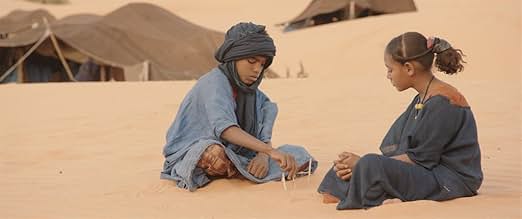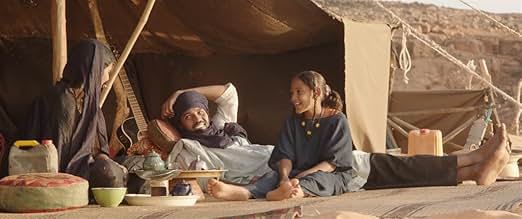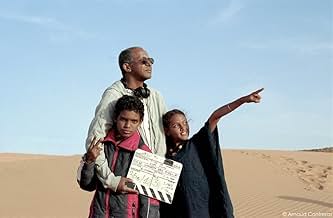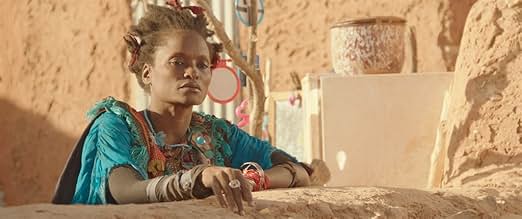CALIFICACIÓN DE IMDb
7.1/10
19 k
TU CALIFICACIÓN
Un pastor y su familia residen en las dunas de Tombuctú. Sus tranquilas vidas - normalmente libres de jihadistas determinados en controlar su fe - se ven repentinamente trastornadas.Un pastor y su familia residen en las dunas de Tombuctú. Sus tranquilas vidas - normalmente libres de jihadistas determinados en controlar su fe - se ven repentinamente trastornadas.Un pastor y su familia residen en las dunas de Tombuctú. Sus tranquilas vidas - normalmente libres de jihadistas determinados en controlar su fe - se ven repentinamente trastornadas.
- Dirección
- Guionistas
- Elenco
- Nominado a 1 premio Óscar
- 33 premios ganados y 28 nominaciones en total
Ibrahim Ahmed
- Kidane
- (as Ibrahim Ahmed dit Pino)
Yoro Diakité
- Djihadiste
- (as Yoro Diakite)
Weli Kleïb
- Juge
- (as Weli Cleib)
- Dirección
- Guionistas
- Todo el elenco y el equipo
- Producción, taquilla y más en IMDbPro
Opiniones destacadas
For someone raised in Mauritania as I was, it was quite something to watch the first Mauritanian movie nominated for a Foreign Film Oscar. I saw it in, of all places, in a movie theatre in Rio de Janeiro, the first week of its release in Brazil.
The language of cinema is truly universal as you see people who belong to an entirely different culture react in a similar way to someone from that culture. Of course there are some references not easy to get, such as the one to music lauding the Prophet by Mauritanian female artist Dimi mint Abba which is heard in a key scene showing how absurd these Islamists' prohibitions are.
Unsure, also, whether people can tell when different actors use different languages (Arabic, Tuareg, Bambara etc.).
The soccer game scene is one of the best I saw this year on the big screen, and the one with the killing of astounding beauty.
Definitely a great director at work here, despite obvious limited resources.
The language of cinema is truly universal as you see people who belong to an entirely different culture react in a similar way to someone from that culture. Of course there are some references not easy to get, such as the one to music lauding the Prophet by Mauritanian female artist Dimi mint Abba which is heard in a key scene showing how absurd these Islamists' prohibitions are.
Unsure, also, whether people can tell when different actors use different languages (Arabic, Tuareg, Bambara etc.).
The soccer game scene is one of the best I saw this year on the big screen, and the one with the killing of astounding beauty.
Definitely a great director at work here, despite obvious limited resources.
A film about the daily reality of Islam fundamentalism is a courageous project - even more so when the maker himself is a Muslim. For this reason alone, 'Timbuktu' cannot be praised enough. It will get plenty of international exposure, because this film is the first ever Oscar entry from Mauritania, and luckily it made the Foreign Language shortlist of nine candidates, out of 83 entries.
'Timbuktu' shows how Libyan jihadists invade Mali and turn the lives of the locals upside down. The Malinese are no longer allowed to play music or to smoke cigarettes, the women are obliged to cover their heads when in public, and sharia courts are issuing cruel and undeserved punishments. In spite of all this, the film is not at all harsh or bleak. On the contrary, most scenes show the Malinese living an idyllic life and trying to make the best of the situation. Some scenes are almost hilarious: the jihadists have to cope with serious language barriers to get their message across, they are unable to drive cars and even break their own rules by secretly smoking cigarettes.
Filmed in neighbouring Mauritania, the movie is full of beautiful landscapes, nice buildings and good-looking people. This is exactly what bothered me a little bit: sometimes you have the impression that you're watching a documentary on National Geographic Channel, showing the beauty of Mali. I can't imagine life in this dirt poor country being even half as peaceful and harmonious as is suggested in this film. A little more third world realism would have been appropriate, including the daily struggle for life of people living in extreme poverty.
Nevertheless, the film is a joy to watch, and contains some extremely beautiful scenes. One example is the scene of a football team playing a game without a ball, because it is confiscated by the jihadists. A perfect and original way to show how Muslim fundamentalism can be defeated, against all odds.
'Timbuktu' shows how Libyan jihadists invade Mali and turn the lives of the locals upside down. The Malinese are no longer allowed to play music or to smoke cigarettes, the women are obliged to cover their heads when in public, and sharia courts are issuing cruel and undeserved punishments. In spite of all this, the film is not at all harsh or bleak. On the contrary, most scenes show the Malinese living an idyllic life and trying to make the best of the situation. Some scenes are almost hilarious: the jihadists have to cope with serious language barriers to get their message across, they are unable to drive cars and even break their own rules by secretly smoking cigarettes.
Filmed in neighbouring Mauritania, the movie is full of beautiful landscapes, nice buildings and good-looking people. This is exactly what bothered me a little bit: sometimes you have the impression that you're watching a documentary on National Geographic Channel, showing the beauty of Mali. I can't imagine life in this dirt poor country being even half as peaceful and harmonious as is suggested in this film. A little more third world realism would have been appropriate, including the daily struggle for life of people living in extreme poverty.
Nevertheless, the film is a joy to watch, and contains some extremely beautiful scenes. One example is the scene of a football team playing a game without a ball, because it is confiscated by the jihadists. A perfect and original way to show how Muslim fundamentalism can be defeated, against all odds.
In the middle of the beauty of Saharian Africa, a shepherd and his lovely wife have to face the punishment of jihad's authorities in Timbuctu, a town in Mali. Religious authorities control even the most intimate gestures in the middle of crude poverty. A moral dictator, as usual conducts himself in double standard. Jihadism, persecutes not only sensual expressions such as the beauty of songs and music played by the people in the village, but also any expression of individuality. Amine Bouhafa's, music compositions are profoundly moving as also the sound of the original language, a soothing tender sound. The random of being born in such a place simply changes the life and options of the characters, leaving very little to free will.
At the end of Woody Allen's Bananas, the leader of the successful Latin American revolution starts making crazed pronouncements: "The official language of the country will be Swedish! Everyone must change their underwear every day, and wear it on the outside so we can check!" That's kind of what happens when the jihadists come to town in Timbuktu, only its tragic, not funny. A bunch of mostly foreigners with AK-47s show up in a Muslim community, tell all the locals they're not Muslim enough, and oh, by the way, use the Qaran to justify taking anything they feel like taking, including marriageable young women. You come away with a sense of what it feels like for ordinary people to live through this, and it's not pretty at all.
On April 1, 2012, the National Movement for the Liberation of Azawad (MNLA) and the Al Qaeda linked Ansar Dine, took over Timbuktu in the African country of Mali, and placed it under Sharia law. Director Abderrahmane Sissako was born in his mother's country of Mauritania, but spent most of his life in Mali, his father's place of birth. Sissako's main goal in "Timbuktu," is to expose both the harsh rule of the Jihadists along with their hypocrisy.
Sissako begins his story with images of Africa animist statutes being machine-gunned (off screen) by the newly minted oppressors of Timbuktu. Sissako's Jihadists are not simply one-dimensional villains. The leader of the lot, Abdelkrim, hails from Libya and must utilize an interpreter to communicate his harsh vision of Islam. Despite his puritanical orders, Abdelkrim is not averse to talking shop about soccer (which is banned in the city) as well as smoking cigarettes.
Abdelkrim soon realizes that his local conscripts aren't as enthusiastic about Jihad than he is. He attempts to coach one of his local soldiers to fashion a propaganda message before a video camera but the young man just doesn't seem to be able to say things like he means it.
While the Jihadists drive around in SUV's with machine guns slung over their shoulders, the administration of Sharia law proceeds at a snail's pace. This is probably due to the slow paced nature of life in that part of the world to begin with. I was expecting brutal large scale massacres along the lines of ISIS in Syria or Iraq, but most of the jihadists' violent actions are selective: a woman receives lashes for singing and a couple is stoned to death for committing adultery.
Sissako doesn't focus a great deal of time in fleshing out his victims, although a couple of his characters hit the mark: the odd but interesting Haitian female shaman who isn't afraid to thumb her nose at her oppressors as well as a local Iman who attempts to reason with the jihadists over one of their soldiers taking a young girl as his bride against her wishes.
Sissako's main character who constitutes the main part of the narrative is Kidane, a local herder who lives out in the countryside with his wife and daughter. As A. O. Scott argues, "He is a symbol of decency and tolerance, of everything the extremists want to destroy, precisely because he is an intriguing, fully rendered individual." I'm not sure if I agree with Mr. Scott that Kidane is "full rendered," as Mr. Sissako goes out of his way to emphasize the character's saintliness a little too often (yes we do come to realize that Kidane's daughter does mean just about everything to him).
Kidane does have an Achilles heel and Sissako perhaps suggests that Kihane's thirst for revenge may be endemic in the culture. After a local fisherman kills one of his prize cows, Kihane goes to "talk" to him, carrying a gun (his wife warns him not to carry the gun, but he ignores her). Sure enough, the argument between the two turns into a killing-whether the shot that was fired occurred during the struggle or was intentional-is unclear. Kihane ends up before the Jihadi court but probably would have ended up in the same situation, no matter who was administering justice.
Some critics have suggested that Sissako's style is akin to Brecht. Certainly a good part of his strategy is to make his audience aware of social injustice and exploitation in a part of the world most westerners are not familiar with. If some of his characters seem a bit sketchy, that's because Sissako has fashioned more of a fable than docudrama. Under the veneer of Sissako's tragic landscape, the clarion call for freedom continues to resonate.
Sissako begins his story with images of Africa animist statutes being machine-gunned (off screen) by the newly minted oppressors of Timbuktu. Sissako's Jihadists are not simply one-dimensional villains. The leader of the lot, Abdelkrim, hails from Libya and must utilize an interpreter to communicate his harsh vision of Islam. Despite his puritanical orders, Abdelkrim is not averse to talking shop about soccer (which is banned in the city) as well as smoking cigarettes.
Abdelkrim soon realizes that his local conscripts aren't as enthusiastic about Jihad than he is. He attempts to coach one of his local soldiers to fashion a propaganda message before a video camera but the young man just doesn't seem to be able to say things like he means it.
While the Jihadists drive around in SUV's with machine guns slung over their shoulders, the administration of Sharia law proceeds at a snail's pace. This is probably due to the slow paced nature of life in that part of the world to begin with. I was expecting brutal large scale massacres along the lines of ISIS in Syria or Iraq, but most of the jihadists' violent actions are selective: a woman receives lashes for singing and a couple is stoned to death for committing adultery.
Sissako doesn't focus a great deal of time in fleshing out his victims, although a couple of his characters hit the mark: the odd but interesting Haitian female shaman who isn't afraid to thumb her nose at her oppressors as well as a local Iman who attempts to reason with the jihadists over one of their soldiers taking a young girl as his bride against her wishes.
Sissako's main character who constitutes the main part of the narrative is Kidane, a local herder who lives out in the countryside with his wife and daughter. As A. O. Scott argues, "He is a symbol of decency and tolerance, of everything the extremists want to destroy, precisely because he is an intriguing, fully rendered individual." I'm not sure if I agree with Mr. Scott that Kidane is "full rendered," as Mr. Sissako goes out of his way to emphasize the character's saintliness a little too often (yes we do come to realize that Kidane's daughter does mean just about everything to him).
Kidane does have an Achilles heel and Sissako perhaps suggests that Kihane's thirst for revenge may be endemic in the culture. After a local fisherman kills one of his prize cows, Kihane goes to "talk" to him, carrying a gun (his wife warns him not to carry the gun, but he ignores her). Sure enough, the argument between the two turns into a killing-whether the shot that was fired occurred during the struggle or was intentional-is unclear. Kihane ends up before the Jihadi court but probably would have ended up in the same situation, no matter who was administering justice.
Some critics have suggested that Sissako's style is akin to Brecht. Certainly a good part of his strategy is to make his audience aware of social injustice and exploitation in a part of the world most westerners are not familiar with. If some of his characters seem a bit sketchy, that's because Sissako has fashioned more of a fable than docudrama. Under the veneer of Sissako's tragic landscape, the clarion call for freedom continues to resonate.
¿Sabías que…?
- TriviaThe scene in which the cow was killed with a spear was done by sedating the cow under the supervision of a veterinarian and adding the spear digitally in post production - the animal was not harmed.
- ErroresIn the stoning scene, both man and woman are buried up to their necks. In a proper Islamic stoning (rajm), the woman should only be buried up to her waist.
- ConexionesFeatured in The Oscars (2015)
- Bandas sonorasShooting The Statues
Composed, Arranged and Orchestrated By Amin Bouhafa
with The City of Prague Philharmonic Orchestra
© 2014 Universal Music France
Selecciones populares
Inicia sesión para calificar y agrega a la lista de videos para obtener recomendaciones personalizadas
- How long is Timbuktu?Con tecnología de Alexa
Detalles
- Fecha de lanzamiento
- Países de origen
- Sitios oficiales
- Idiomas
- También se conoce como
- Timbuktu
- Locaciones de filmación
- Oualata, Mauritania(as Timbuktu)
- Productoras
- Ver más créditos de la compañía en IMDbPro
Taquilla
- Total en EE. UU. y Canadá
- USD 1,076,075
- Fin de semana de estreno en EE. UU. y Canadá
- USD 45,110
- 1 feb 2015
- Total a nivel mundial
- USD 7,179,391
- Tiempo de ejecución1 hora 36 minutos
- Color
- Relación de aspecto
- 2.35 : 1
Contribuir a esta página
Sugiere una edición o agrega el contenido que falta

Principales brechas de datos
By what name was Timbuktú (2014) officially released in India in English?
Responda

























